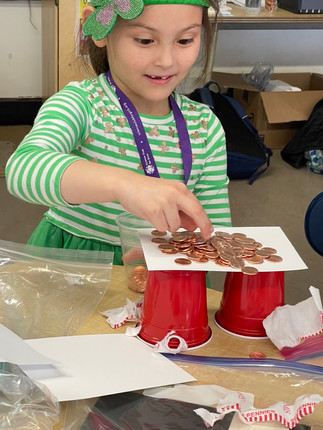Peek into Programs: Loads of Fun with "Dream Home" Curriculum
- scfg94
- Jun 20, 2023
- 3 min read

Wednesday, June 7th was the final day of our Spring Science Clubs! This semester, 530 K-12 participants—83% of whom were underrepresented in STEM by race and/or socioeconomic factors—took part in our Dream Home curriculum. Led by 121 volunteer mentors—with 65% also hailing from underrepresented communities—participants became architects and engineers as they learned principles of design, materials science, accessibility, and sustainability to design and build their own "dream homes."
Some favorite projects included constructing paper bridges to hold pennies, building model wheelchairs, drawing intricate 2D floor plans, and, of course, building a 3D “dream home” model, complete with stained glass windows, furniture, and many more complex (and sometimes imaginative) features!

Whether our young architects participated in an in-person Science Club at one of our four partner schools, or Zoomed in from various locations across Greater Boston, students enjoyed learning math, engineering, and physics concepts in such a creative way. By continuing our hybrid model of delivering both in-person and virtual Science Clubs, we are expanding options for families and even further reducing barriers to access for underrepresented populations, one of Science Club for Girls’ primary goals.
In reflecting on this semester, Abigail, a STEM student at Northeastern University who serves as a mentor for 3rd-5th grade students, said:
“My favorite memory with SCFG was creating the model homes. I was super excited with the engagement from the young scientists as they expressed so much creativity. I also enjoyed that one of them said they want to [work in STEM] when they grow up because of this project. I think it really speaks to our mission here at SCFG that girls are eager to get involved in STEM fields.”
This semester’s focus allowed for participants’ curiosity and creativity to flourish! Not only did they learn about concepts like scale, measurement, constructing strong foundations, and insulation, but they did so in a way that was personalized to them. Some whimsical home amenities included unicorn-themed movie theaters, water parks, ball pits, and even floating planets! Mentors remarked about how this open, safe space for artistic expression had two noticeable impacts: 1) the girls were more eager to share their creations with the group, and 2) they were able to make connections between their own lives and the STEM principals they were being exposed to.
Even girls who never imagined themselves pursuing STEM as a career before participating in Science Club were able to discover some topic or demonstration that piqued their interest. Beatriz, an Engineer at Amazon who serves as a mentor for 6th-8th grade students, explained one scenario with a mentee in her group:
"One day we were doing an engineering activity where we had to make an insulator to transport an ice cream sandwich to a friend. I had never seen [one of my mentees] that interested or happy before. She was leading her team, brainstorming, prototyping, and was just so excited to participate. I explained to her that this too could be engineering and I asked her if she liked it. She told me it was “okay” but I think her smile said it all.”

This exposure to the endless possibilities in STEM is what Science Club for Girls gives our participants and their families. The fun and curiosity doesn't just stay at Science Club. So many of our participants excitedly bring what they have learned back home to engage their friends, siblings, and even parents/guardians! Parents often express how impactful SCFG’s curriculum and mentoring is, giving their children opportunities not always offered in school settings. One parent reflects"
“After the session ends, [our daughter] continues exploring and playing with the session's supplies to try new things that were not included within the session. She seems to think about the projects throughout the week, and is interested in continuing her exploration by asking her dad questions and experimenting with new hypotheses.”
This semester would not have been possible without the help of our wonderful supporters, funders, collaborating schools, packing partners, and, of course, our inquisitive K-12 grade participants, including our amazing high school Junior Mentors, volunteer mentors, parents, and caregivers! THANK YOU for your continuous support and we are so excited for our upcoming programs, including Summer Rocketry and Fall 2023 Science Clubs.

















